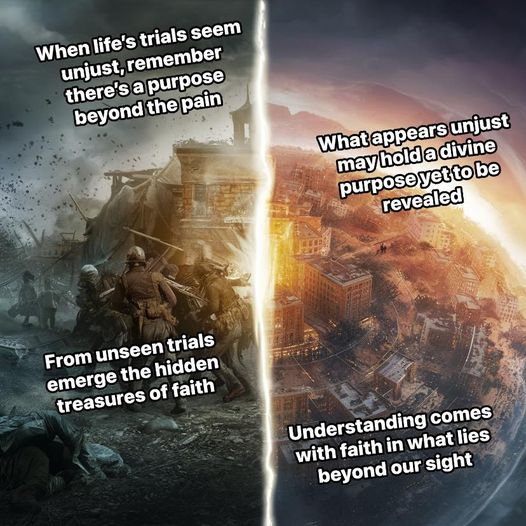
Humans face numerous challenges in life that often defy clear explanations, particularly when trying to understand the reasons behind pain and suffering, such as the death of a baby before birth or during childhood, or the massacre of unarmed civilians in mass shootings or war zones. God does not send angels to save children in these tragic situations. Some people are born into privilege, while others endure hardship and affliction. We question why oppression exists and why the Almighty does not prevent such suffering. These questions arise because we struggle to accept the principle of tests and trials upon which the Almighty has established this world. We either want to avoid these tests altogether or prefer them to happen on our own terms.
This world operates on the basis of tests and trials because humans are endowed with both the intention to act and the freedom to carry out those actions. Since we possess free will, it is essential that we have the opportunity to exercise it. Therefore, it is crucial that the Almighty does not intervene when we are using our freedom of choice. However, the misuse of this freedom can lead to negative outcomes, such as stealing, killing, injustice, and oppression. On the other hand, this same freedom allows us to address complex problems facing humanity and to build institutions like justice systems and laws to maintain peace, which reflect the right use of our freedom of choice.
Everything that happens in the world follows the divine laws and principles established by Almighty God. While humans are placed on this small planet and exercise their free will and authority, everything ultimately remains under God’s control. Even when we commit evil actions, it is due to the freedom that has been granted to us. There is wisdom in His decisions. If God does not immediately stop wrongdoers, it is not because He is helpless or lacks power, but rather because His wisdom may be revealed later—perhaps in a year, a decade, or even a century—or it may only become clear on the Day of Judgment.
In the visible world, we witness suffering, killings, and wars, but in the invisible realm, something very different, or even good, may be unfolding, known only to God. Our desire to understand God’s intentions or how He governs the world will remain unfulfilled in this life because all our knowledge is derived from observation and experience. This constitutes the boundary of our understanding. What lies beyond it is part of the divine wisdom that may only be revealed in the hereafter.
A powerful illustration of this concept is found in the story of Moses (PBUH) in the Quran (18:60-82), where he encounters a mysterious figure (most probably an Angel in human form) , known as Al-Khidr in Islamic tradition, during his journey to seek knowledge. God instructed Moses to find this servant, who possessed a special kind of knowledge that Moses did not have. During their journey, Al-Khidr performed several actions that seemed perplexing and unjust to Moses. First, Al-Khidr made a hole in a boat belonging to poor fishermen, an act that appeared harmful and inexplicable to Moses. Then, Al-Khidr killed a young boy, an act that shocked and deeply disturbed Moses. Lastly, in a town where the people refused to offer them hospitality, Al-Khidr rebuilt a crumbling wall without any payment, which seemed odd to Moses. After these actions, Moses questioned Al-Khidr’s motives, seeking to understand the reasoning behind such seemingly unjust deeds. Al-Khidr then explained the wisdom behind each action, revealing the hidden good and divine purpose that was not immediately apparent to Moses.
The Boat: Al-Khidr damaged the boat to prevent it from being seized by a king who was capturing all seaworthy vessels. By doing so, he protected the fishermen’s livelihood.
The Boy: Al-Khidr killed the boy because, according to divine knowledge given to him, the boy would grow up to be a source of great pain and disbelief for his pious parents. God intended to replace him with a child who would be righteous and better for them.
The Wall: The wall belonged to two orphan boys, and beneath it was a treasure left for them by their righteous father. If the wall had collapsed, the townspeople would have taken the treasure. Al-Khidr repaired the wall to preserve the treasure until the boys were old enough to claim it.
Through these actions, Al-Khidr demonstrates that God’s wisdom often transcends human understanding. What may seem harmful or unjust on the surface may serve a greater good or divine purpose that is not immediately apparent.
This story serves as a reminder that, in the visible world, we may not always understand why certain events occur or why suffering exists. However, in the invisible realm, God’s wisdom is at work in ways beyond our comprehension, and it is only with patience and faith that the true nature of His plan may be revealed.

